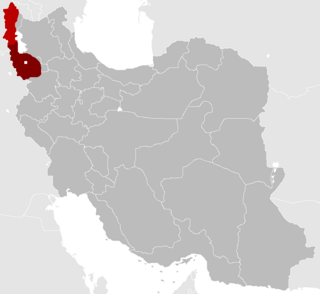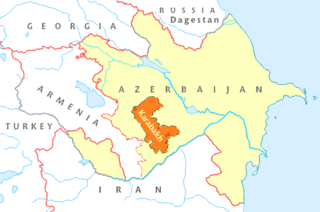A United Nations General Assembly resolution is a decision or declaration voted on by all member states of the United Nations in the General Assembly.

United Nations Security Council Resolution 3 was adopted on 4 April 1946. The Council acknowledged that Soviet troops occupying Iran were not removed in accordance with the Tri-partite Treaty of 29 January. Further proceedings surrounding the Iranian crisis were deferred until 6 May, when Soviet withdrawal was to be complete.

United Nations Security Council Resolution 5 was adopted on 8 May 1946. The Council deferred further proceedings surrounding the Iranian crisis until Iran submitted a complete report on the subject.

United Nations Security Council resolution 822 was adopted unanimously on 30 April 1993. After expressing concern at the deterioration of relations between Armenia and Azerbaijan, and the subsequent escalation of armed hostilities and deterioration in the humanitarian situation in the region, the Council demanded the immediate cessation of hostilities and the immediate withdrawal of Armenian occupying forces in the Kalbajar district near Nagorno-Karabakh in Azerbaijan.

In United Nations Security Council resolution 853, adopted unanimously on 29 July 1993, after reaffirming Resolution 822 (1993), the Council expressed its concern at the deteriorating relations between Armenia and Azerbaijan and condemned the seizure of the district of Agdam and other areas of Azerbaijan, demanding a complete withdrawal from the areas by Armenians.

United Nations Security Council resolution 874, adopted unanimously on 14 October 1993, reaffirmed sovereignty and territorial integrity of the Azerbaijani Republic and of all other States in the region, called for the preservation of the ceasefire, cessation of hostilities and withdrawal of forces from recently occupied districts of the Republic of Azerbaijan, and reaffirmed resolutions 822 (1993) and 853 (1993). The Council expressed its concern at "...the conflict in and around the Nagorny Karabakh region of the Azerbaijani Republic, and of the tensions between the Republic of Armenia and the Azerbaijani Republic...", and called upon the parties to observe the ceasefire agreed with by the government of Russia and OSCE Minsk Group.

United Nations Security Council resolution 884, adopted unanimously on 12 November 1993, after reaffirming resolutions 822 (1993), 853 (1993) and 874 (1993), the Council expressed its concern at the continuing conflict between Armenia and Azerbaijan in Nagorno-Karabakh and condemned violations of the ceasefire between the parties, particularly the occupation of the Zəngilan district and city of Goradiz. Resolution 884 is the fourth and last of the resolutions adopted by the UN Security Council regarding the Nagorno-Karabakh conflict.
This page lists in alphabetical order articles related to the Republic of Artsakh and Nagorno-Karabakh region. For a topically arranged list of articles, please see Outline of the Republic of Artsakh.

United Nations General Assembly Resolution 62/243, titled "The Situation in the Occupied Territories of Azerbaijan", is a resolution of the United Nations General Assembly about the situation in Nagorno-Karabakh, which was adopted on March 14, 2008 at the 62nd session of the General Assembly. It became the seventh United Nations document concerning Nagorno-Karabakh and the third and last United Nations General Assembly document on it.
Organisation of the Islamic Conference Resolution 10/11, titled "The aggression of the Republic of Armenia against the Republic of Azerbaijan", is an Organisation of the Islamic Conference Resolution on Nagorno-Karabakh conflict adopted by its member states on March 13–14, 2008 during the OIC summit in Dakar, Senegal. The resolution, titled "Aggression by the Republic of Armenia against the Republic of Azerbaijan," aims to express concern over Armenia's aggression against Azerbaijan and to provide comprehensive support for the territorial integrity of the Republic of Azerbaijan. The Dakar conference is considered a "successful step" towards supporting Azerbaijan's just cause. It was during this session that the new Charter of the Islamic Cooperation Organization was adopted, and in the section on the purposes and objectives of this international organization, it was stipulated that the member states support the right of states under occupation to restore their territorial integrity.
Organisation of the Islamic Conference of Foreign Ministers Resolution 10/37, titled "The aggression of the Republic of Armenia against the Republic of Azerbaijan", is a set of three Organisation of the Islamic Conference resolutions on Nagorno-Karabakh conflict adopted at the 37th annual session of Foreign Ministers of OIC member states on May 18–20, 2010 held in Dushanbe, Tajikistan. The session was attended by 80 delegations from member states, observer states and international organizations.
Council of Europe Parliamentary Assembly (PACE) Resolution 1416 (2005), titled “The conflict over the Nagorno-Karabakh region dealt with by the OSCE Minsk Conference”, is a resolution of PACE about the situation on occupied territories currently in the possession of Azerbaijan by Armenian military forces, adopted by PACE on January 25, 2005.

United Nations Security Council Resolution 2058 was unanimously adopted on 19 July 2012. Azerbaijan and Pakistan decided to abstain.

United Nations Security Council Resolution 2068 was adopted on 19 September 2012. It declared the readiness of the United Nations Security Council to impose sanctions on armed groups persistently violating the human rights of children including child abuse and child soldier.

The political status of Nagorno-Karabakh remained unresolved from its declaration of independence on 10 December 1991 to its September 2023 collapse. During Soviet times, it had been an ethnic Armenian autonomous oblast of the Azerbaijan Soviet Socialist Republic. Following the dissolution of the Soviet Union, a conflict arose between local Armenians who sought to have Nagorno-Karabakh join Armenia and local Azerbaijanis who opposed this.

United Nations Security Council resolution 2114, adopted on 30 July 2013, after recalling all relevant resolutions on Cyprus, the Council discussed expanding the UN peacekeeping mission in Cyprus as part of a wider process to settle the Cyprus dispute.

United Nations Security Council resolution 2089 was adopted in 2013. Azerbaijan abstained from voting.
Azerbaijan has been a member in the United Nations since March 2, 1992, after the UN General Assembly admitted Azerbaijan at its 46th session. The Permanent Mission of the Republic of Azerbaijan was opened in New York City in May 1992. On October 29, 1991, soon after gaining independence from the Soviet Union, Azerbaijan applied to the UN General Assembly for joining the organization. Azerbaijan was elected as a non-permanent member of the UN Security Council for the term of 2012–2013.
United Nations General Assembly Resolution 48/144 of 20 December 1993 is a resolution in which the General Assembly expressed its concern at the ongoing degradation of the humanitarian situation in Azerbaijan because of the displacement of considerable number of citizens due to Nagorno Karabakh conflict and supporting "emergency international assistance to refugees and displaced persons in Azerbaijan". The resolution is titled “48/114. Emergency international assistance to refugees and displaced persons in Azerbaijan”. It became the fifth United Nations document concerning Nagorno-Karabakh and the first United Nations General Assembly document on humanitarian aid to those affected by this conflict. This resolution was the first international document affirming the number of refugees and displaced persons in Azerbaijan exceeded one million. The document does not make any specific reference to previous UN resolutions on the ongoing conflict, but "its relevant resolutions regarding humanitarian assistance to refugees and displaced persons". The resolution was adopted by consensus without voting.











